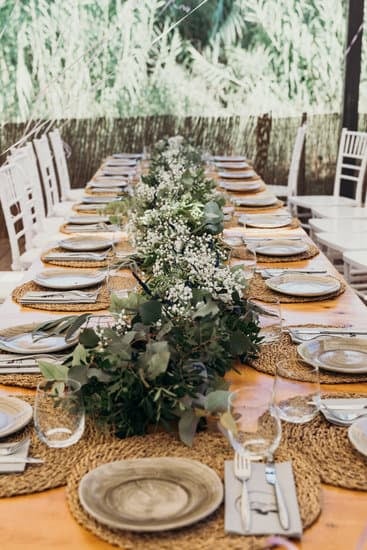Your wedding invitations are the first glimpse your guests will have of your special day, setting the tone for what is to come. In this article, we will explore how to choose wedding invitations that truly reflect the style and theme of your wedding. From setting a budget to selecting the perfect design and colors, as well as choosing the right paper and printing techniques, every aspect plays a crucial role in creating the perfect invitation suite.
Setting a budget for your wedding invitations is an essential step in the planning process. We will discuss how to determine a budget that aligns with your overall wedding expenses while considering factors such as guest count, design complexity, and additional customization options. By understanding these considerations, you can make informed decisions about where to allocate your resources when it comes to creating stunning wedding invitations that leave a lasting impression.
Once you have established a budget, the next step is choosing the design that best represents you as a couple and sets the tone for your wedding day. Whether you prefer a traditional, modern, or custom design, we will explore various options to help you narrow down the choices and find the perfect fit for your special day.
Keep reading for valuable insights on selecting the right color scheme, exploring different paper options and printing techniques, adding personalized touches, addressing and mailing etiquette, as well as including RSVP and details cards in your invitation suite.
Setting a Budget
When it comes to planning a wedding, one of the first steps in choosing wedding invitations is setting a budget. Determining how much you are willing to spend on your invitations is crucial in ensuring that you stay within your overall wedding budget. Here are some factors to consider when setting a budget for your wedding invitations:
- Quantity: The number of guests you plan to invite will directly impact the cost of your invitations. Be sure to have an estimated guest count before finalizing your budget.
- Design Complexity: Intricate designs, custom illustrations, and special printing techniques can significantly increase the cost of wedding invitations. Consider the level of detail you want before setting your budget.
- Additional Cards: If you plan on including details cards, RSVP cards, or envelopes with liners, these additional elements should be factored into your budget.
It’s important to remember that wedding invitations are more than just pieces of paper – they are the first glimpse into the style and theme of your special day. Setting a realistic budget will help guide your choices as you move forward with selecting the perfect invitations for your wedding.
Finally, don’t forget about postage. Factor in the cost of stamps and any additional postage needed for heavier or larger wedding invitation suites when determining your budget.
Choosing the Design
When it comes to choosing the design for your wedding invitations, there are several options to consider that can set the tone for your special day. Traditional designs often feature classic motifs such as floral patterns, monograms, and script fonts that exude elegance and timelessness.
On the other hand, modern designs embrace clean lines, minimalist aesthetics, and contemporary typography for a chic and sophisticated look. For couples who want something truly unique, custom designs offer the opportunity to create personalized invitations that reflect their individual style and love story.
Traditional Designs
Traditional wedding invitations often incorporate timeless elements such as embossed borders, delicate flourishes, and formal wording. These designs are well-suited for formal weddings held in traditional venues such as churches or ballrooms. Classic color palettes like ivory, gold, and navy are popular choices for traditional invitations, evoking a sense of sophistication and refinement.
Modern Designs
For couples planning a trendy and unconventional wedding celebration, modern invitation designs may be the ideal choice. Bold typography, geometric patterns, and unexpected color combinations can make a statement and capture the essence of a contemporary wedding style. When selecting modern designs, consider opting for unconventional shapes or non-traditional materials to further elevate the avant-garde aesthetic of the invitations.
Custom Designs
Custom-designed wedding invitations provide an opportunity for couples to showcase their personality through one-of-a-kind stationery. From bespoke illustrations that depict meaningful memories to custom calligraphy that adds a personal touch to each invitation, there are endless possibilities for creating truly unique designs. Working with a talented stationer or graphic designer can bring your vision to life and result in invitations that are both stylish and sentimental.
Ultimately, when choosing the design for your wedding invitations, it’s essential to select an option that resonates with your personal style as a couple while also considering the overall theme of your wedding. Whether you opt for traditional elegance, modern flair, or custom creativity, your wedding invitations will serve as a preview of the unforgettable celebration to come.
Selecting the Right Colors
When it comes to choosing the right colors for your wedding invitations, there are several factors to consider. The color scheme of your invitations should not only match the theme of your wedding, but also reflect your personal preferences as a couple.
One tip for choosing the best color scheme is to take inspiration from your wedding venue, flowers, or even your bridal party attire. This will help ensure that your invitations tie in seamlessly with the overall aesthetic of your big day.
Another important consideration when selecting the right colors for your wedding invitations is to think about the tone and formality of your event. For a more formal affair, classic and timeless colors like navy, burgundy, or gold can add an elegant touch to your invitations. On the other hand, if you’re planning a more casual or modern celebration, you might opt for lighter pastel shades or bold, vibrant hues that reflect your personality as a couple.
It’s also essential to keep in mind any cultural or symbolic meanings associated with certain colors. For example, white is often associated with purity and is a traditional choice for weddings in many Western cultures. In contrast, red is considered lucky in some Eastern cultures and is often used in wedding celebrations. Whatever colors you choose, make sure they resonate with both of you as a couple and contribute to creating an inviting first impression of your special day.
| Factors to Consider | Tips |
|---|---|
| Wedding theme and venue | Take inspiration from these sources to ensure cohesiveness |
| Tone and formality | Consider classic vs. modern color options based on the tone of the event |
| Cultural and symbolic meanings | Awareness of different cultural associations with specific colors |
Paper Options
When it comes to choosing the perfect wedding invitations, one of the most important aspects to consider is the type of paper to use. The paper sets the tone for the entire invitation and can greatly impact its overall look and feel. Here are some popular paper options to consider when selecting wedding invitations:
- Cotton: Cotton paper is known for its luxurious feel and durability. It is a timeless choice for wedding invitations and works well with various printing techniques.
- Linen: Linen paper has a textured finish that adds an elegant touch to wedding invitations. It provides a classic look and feels great to the touch.
- Recycled: For eco-friendly couples, recycled paper is a sustainable option for wedding invitations. It comes in different weights and finishes, making it versatile for various design preferences.
- Vellum: Vellum is a semi-transparent paper that can add a delicate and romantic element to wedding invitations. It can be layered over other papers or used on its own for a unique look.
- Matte vs. Glossy: Consider the finish of the paper, whether matte or glossy, based on the desired aesthetic. Matte finishes offer a more muted appearance, while glossy finishes provide more shine and vibrancy.
When choosing the right paper for your wedding invitations, it’s essential to consider factors such as overall style, printing compatibility, and budget constraints. By carefully considering these elements, you can ensure that your wedding invitations are not only visually stunning but also reflective of your personal style and preferences.
Printing Techniques
When it comes to wedding invitations, the printing technique can significantly impact the overall look and feel of the design. Letterpress, foiling, and digital printing are three popular options for creating stunning wedding invitations. Each technique has its own unique characteristics and advantages, so it’s essential to understand the differences before making a decision on which one to choose.
Letterpress printing involves pressing inked metal type or plates onto paper, creating a tactile and elegant finish. This classic printing method is known for its luxurious texture and timeless appeal. Foiling, on the other hand, uses heat to apply metallic or pigmented foil onto the paper, resulting in a shiny and sophisticated effect. Digital printing offers versatility and endless customization options, making it ideal for couples who want intricate designs and vibrant colors on their wedding invitations.
When deciding on a printing technique for your wedding invitations, consider your wedding theme, budget, and personal preferences. Each method comes with its own cost and production timeline, so it’s important to factor in these considerations when making a decision.
| Printing Technique | Characteristics |
|---|---|
| Letterpress | Elegant texture Luxurious finish |
| Foiling | Shiny effect Metallic or pigmented foil application |
| Digital Printing | Versatile Endless design options |
By understanding how each technique can enhance your wedding invitations based on your specific needs and preferences, you can make an informed decision that will set the tone for your special day. With careful consideration of factors such as theme, budget allocation, desired aesthetic effect you wish to achieve with your invites will ensure that your selection of printing techniques aligns with other elements planned for your dream wedding celebration.
Adding Personalized Touches
When it comes to wedding invitations, adding personalized touches can truly make them stand out and reflect the couple’s unique style and personality. One popular way to add personalization is by incorporating monograms into the design. Monograms can be a simple yet elegant addition to the wedding invitations, whether it’s the initials of the couple’s names or a combination of both. It’s a timeless touch that adds a sense of sophistication to the overall design.
Another way to personalize wedding invitations is by including custom illustrations that hold special meaning to the couple. This could be anything from a portrait of the venue where they got engaged, to a drawing of their beloved pet, or even an illustration of something that represents their shared interests. Custom illustrations not only make the invitations one-of-a-kind but also create a memorable keepsake for guests.
Lastly, calligraphy is another beautiful way to add personalization and elegance to wedding invitations. Whether it’s handwritten calligraphy for addressing the envelopes or incorporating calligraphic elements into the design, this art form brings a sense of romance and sophistication to the overall look of the invitations. It’s important for couples to work with experienced calligraphers who can create stunning pieces that truly capture the essence of their love story.
In considering how to choose wedding invitations, finding ways to incorporate personalized touches allows couples to infuse their own style and flair into every detail of their special day. These touches not only make the invitations unique but also give guests a glimpse into what they can expect on this joyous occasion.
Addressing and Mailing
When it comes to addressing and mailing wedding invitations, there are several important aspects to consider in order to ensure a seamless process. From properly addressing the envelopes to assembling the invitation suite and navigating the mailing process, attention to detail is key for a successful outcome.
Proper Addressing
The first step in the addressing and mailing process is ensuring that the envelopes are addressed correctly. This includes using appropriate titles and full names for the recipients, as well as double-checking the accuracy of addresses. Additionally, it’s essential to consider whether inner and outer envelopes will be utilized, and if so, how they will be addressed differently based on their purpose.
Assembling the Invitation Suite
Once the envelopes are addressed, it’s time to assemble the invitation suite. This typically involves placing the main invitation card on the bottom, followed by any additional information or RSVP cards in a specific order. Ensuring that each piece is properly aligned and neatly placed within the envelope is crucial for a polished presentation.
Navigating the Mailing Process
Finally, navigating the mailing process involves determining postage costs based on weight, as well as potential additional postage for square or non-standard sized invitations. It’s also important to carefully hand-cancel each invitation at the post office or utilize custom stamps to prevent damage during processing. Additionally, keeping track of when invitations were sent and any returned mail is essential for managing RSVPs and guest lists effectively.
By paying close attention to these details and following these guidelines for addressing, assembling, and mailing wedding invitations, couples can ensure that their invitations not only look beautiful but also reach their intended recipients in a timely manner without any complications.
RSVP and Details Cards
In conclusion, choosing wedding invitations is a crucial part of the wedding planning process as they set the tone for the entire event. When it comes to selecting the perfect invitations, there are several factors to consider.
First and foremost, setting a budget is essential in determining what options are available. By considering factors such as design, color, paper type, printing techniques, personalization, and addressing and mailing details, couples can ensure that their invitations reflect their style and wedding theme while staying within their budget.
When it comes to choosing the design of wedding invitations, couples have a wide range of options to explore including traditional, modern, and custom designs. Selecting the right colors that match the wedding theme and personal preferences is also crucial in creating visually appealing invitations that will impress guests.
Furthermore, paper options play a significant role in the overall look and feel of the invitations. Considering different paper types, textures, and weights will help create a unique invitation that stands out.
Adding personalized touches such as monograms or custom illustrations can add an extra level of detail to the invitations while various printing techniques like letterpress or foiling can elevate the overall presentation. Additionally, properly addressing and mailing the wedding invitations is essential for ensuring a seamless process.
Finally, including additional information cards and outlining the RSVP process will provide guests with all necessary details for the upcoming celebration. By carefully considering each aspect outlined in this article, couples can confidently select wedding invitations that truly reflect their love story and set the stage for their special day.
Frequently Asked Questions
How Do I Choose a Wedding Invitation?
When choosing a wedding invitation, it’s important to consider the overall theme and style of your wedding. You’ll want the invitation to reflect the formality of the event and convey important details such as date, time, and location.
It’s also a good idea to think about any color schemes or design elements that you’d like to incorporate. Ultimately, select an invitation that speaks to your personal taste and fits within your budget.
What Is the Rule for Wedding Invitations?
The general rule for wedding invitations is to send them out six to eight weeks before the wedding date. This gives guests enough time to make arrangements and RSVP.
If you’re having a destination wedding or inviting guests from out of town, it’s customary to send out save-the-date cards even earlier, around three to four months prior.
How Do I Choose Who to Invite to My Wedding?
Choosing who to invite to your wedding can be a delicate process. Start by creating a list of close family members and friends who you definitely want present on your big day. From there, consider factors such as venue capacity and budget constraints.
Keep in mind that if you’re inviting certain relatives or friends, it may be expected that you also invite other members of their social circle. Ultimately, prioritize inviting those who have had a significant impact on your life and relationship.

I have been involved in marriages for over 20 years helping couples and singles understand more about them.





